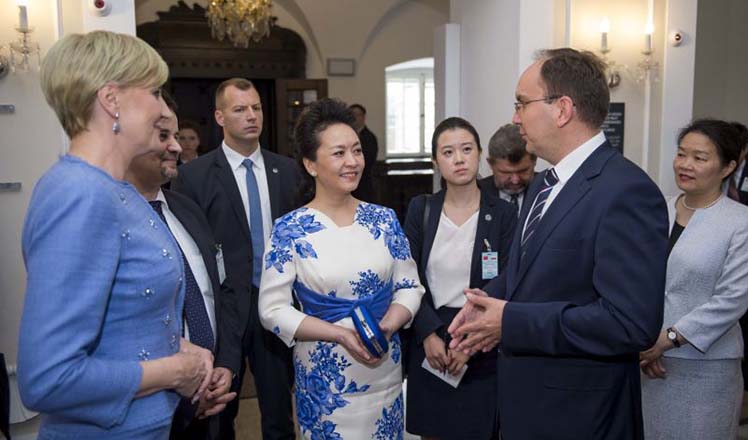Brexit is about governance, not economics
Updated: 2016-06-22 08:24
By MICHAEL SPENCE(China Daily)
|
||||||||
 |
|
Britain goes to the polls on June 23 to decide whether to remain in the European Union. The outcome could certainly have implications for Sino-British relations. Provided to China Daily |
With political and social fragmentation extending well beyond Europe, outsiders may be able to add some perspective to what is really at issue on the British referendum on whether to remain in the European Union.
First, it will come as no surprise that, in terms of the distribution of income, wealth and the costs and benefits of forced structural change, growth patterns in most of the developed world have been problematic for the past 20 years. We know that globalization and some aspects of digital technology (particularly those related to automation and disintermediation) have contributed to job and income polarization, placing sustained pressure on the middle class in every country.
Second, the EU's ongoing crisis (more like a chronic condition) has kept growth far too low and unemployment-especially youth unemployment-unacceptably high. And Europe is not alone. In the United States, while the formal unemployment rate has fallen, large-scale failures in terms of inclusiveness have fueled disenchantment-on both the left and the right-at growth patterns and policies that seem to benefit those at the top disproportionately.
But, for the most part-and again throughout the developed world-effective responses have been missing. Central banks have been left largely alone with objectives that exceed the capacity of their tools and instruments, while elements of the elite wait for a chance to blame monetary policymakers for weak economic performance.
Third, the EU is confronting, in more severe form, a problem facing much of the developed world: powerful forces operating beyond the control of elected officials are shaping citizens' lives, leaving them feeling powerless. But while all countries must deal with the challenges of globalization and technological change, important elements of governance in the EU are beyond the reach of democratic institutions, at least those that people understand and relate to.
This is not to say that local governance is problem-free. It isn't. Corruption, special interests and sheer incompetence are common problems. But democratic governance is in principle fixable, and institutional defenses and countermeasures do exist.
The situation in the eurozone is particularly unstable, owing to citizens' growing alienation from a distant, technocratic elite; the absence of conventional economic adjustment mechanisms (exchange rates, inflation, public investment, and so on); and tight limits on fiscal transfers, which send powerful signals about the real boundaries of cohesion.
Brexit, or the Britain's exit from the EU, is a part of this larger drama. It is primarily about governance, not economics. From a strictly economic point of view, the risks for both Britain and the rest of the EU are almost entirely on the downside. But if that was all there was to the issue, the outcome would be a foregone conclusion in favor of staying.
The real issue-effective and inclusive self-governance-is not an easy one to tackle anywhere, because forces such as technological disruption do not respect national boundaries. In part, Britons are voting on whether their capacity to navigate in these turbulent waters is enhanced or diminished by continued EU membership. But a more fundamental question of political identity is also at stake-just as it was in Scotland's independence referendum in 2014.
Some Britons (perhaps even a majority), and many other EU citizens, still want future generations to think of themselves as Europeans (albeit with a proud British, French, German or Spanish origin), and are prepared to take another shot at reforming Europe's governance structures. And they are right to think that the world would be a far better place with a united, democratic Europe as a major force for both stability and change.
The author, winner of the Nobel Prize for economics, is professor of economics at New York University's Stern School of Business and senior fellow at the Hoover Institution.
Project Syndicate
- British MPs pay tribute to murdered MP Jo Cox
- DPRK deploys Musudan ballistic missile in east coast
- American singer wants to perform concert in Cuba: media
- Rio government denounced for extravagant spending during crisis
- Planned Obama, Dalai Lama meeting protested
- Gravitational waves detected for second time: scientists

 Things you may not know about Summer Solstice
Things you may not know about Summer Solstice
 First lady visits Fryderyk Chopin Museum in Poland
First lady visits Fryderyk Chopin Museum in Poland
 Chinese factories score a goal with Euro 2016
Chinese factories score a goal with Euro 2016
 Euro rookie Welsh makes history to enter knock-out stage
Euro rookie Welsh makes history to enter knock-out stage
 Cavs stun Warriors in Game 7 thriller, LeBron MVP
Cavs stun Warriors in Game 7 thriller, LeBron MVP
 Highlights of awarding ceremony of Shanghai Int'l Film Festival
Highlights of awarding ceremony of Shanghai Int'l Film Festival
 Switzerland draw with France 0-0 to reach round of 16
Switzerland draw with France 0-0 to reach round of 16
 Chinese folk costumes show opens in Beijing
Chinese folk costumes show opens in Beijing
Most Viewed
Editor's Picks

|

|

|

|

|

|
Today's Top News
Abe's blame game reveals his policies failing to get results
Ending wildlife trafficking must be policy priority in Asia
Effects of supply-side reform take time to be seen
Chinese State Councilor Yang Jiechi to meet Kerry
Chinese stocks surge on back of MSCI rumors
Liang avoids jail in shooting death
China's finance minister addresses ratings downgrade
Duke alumni visit Chinese Embassy
US Weekly

|

|







